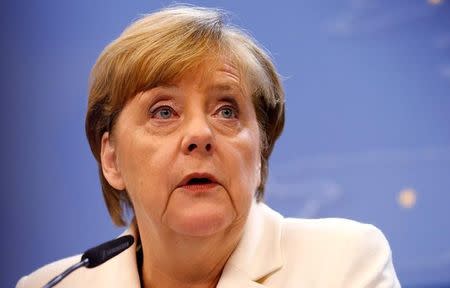Merkel, party leaders meet to rev up German coalition talks - media

By Andrea Shalal
BERLIN (Reuters) - Key allies of Chancellor Angela Merkel on Sunday downplayed reports about a crisis among parties in a potential coalition government, saying it was important to work out differences and reach a sustainable agreement.
Merkel was due to meet with leaders of the other parties on Sunday to smooth the waters after last week's exploratory talks ran into trouble over immigration and climate policy.
The chancellor, whose conservative alliance came first but lost seats in the Sept. 24 national election, is trying to forge a three-way coalition with the pro-business Free Democrats (FDP) and environmental Greens that is untested at a national level.
Bild am Sonntag newspaper said Merkel would try to "rescue" the talks by meeting with Horst Seehofer, who heads the conservative Bavarian CSU party, two officials from the Greens and FDP leader Christian Lindner at an undisclosed location.
Volker Kauder, parliamentary leader of the conservatives, told broadcaster ZDF that such meetings were not unusual, even once a coalition had been formed.
He said it was important to demonstrate that the mainstream parties could govern, a clear nod to the protest votes that propelled the far-right Alternative for Germany party into parliament for the first time.
"It's about more than the individual party positions, it's about building trust in the ability of the democratic parties to take action," Kauder said.
Peter Altmaier, Merkel's chief of staff, told broadcaster ARD a coalition deal looked more promising now than weeks ago, but it could take time to work out solutions on climate and immigration that would stand the test of time.
"We need a result that is in the interest of the country and that will last for four years," he said.
The exploratory talks are due to continue Monday after the three sides failed to reach agreement on immigration and climate issues during an 11-hour session on Thursday.
The possible coalition partners remain at odds over how to meet carbon dioxide emission targets and capping migration.
Many conservatives want to take a harder line on immigration, blaming their election setback on Merkel's decision to allow in more than a million migrants in 2015 and 2016. They want to limit refugee numbers, but the Greens reject such a cap.
Other issues such as pensions and labour regulations - which could be on the agenda on Monday - appear less contentious.
The three blocs are also nearing agreement on the issue of legalising marijuana through pharmacies or other licensed distributors, the Stuttgarter Zeitung newspaper reported.
Alexander Lambsdorff, deputy leader of the FDP parliamentary group, said the FDP and Greens had "no choice but to talk to each other" given the current political circumstances.
The Social Democrats, junior partner to the conservatives over the last four years, have vowed to stay in opposition.
(Reporting by Andrea Shalal; Editing by Susan Fenton)

